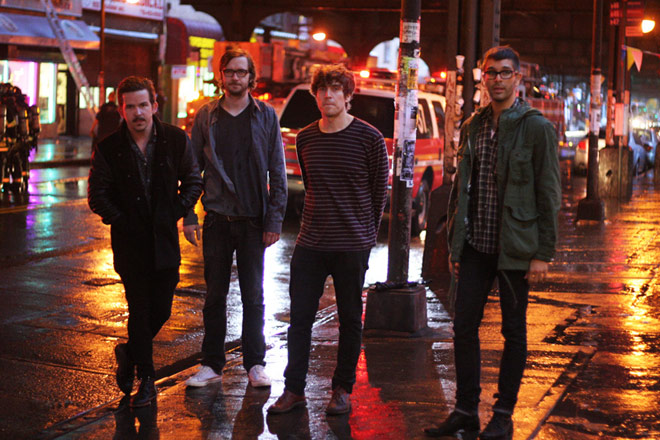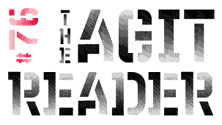
And the Soundtrack to Paradise Lost
by Kevin J. Elliott
Approaching New York City’s Bear in Heaven via their much blogged about nostalgia trip “Lovesick Teenagers” is prone to give listeners the wrong impression. It’s not that the song, a pulsating synth dream equivalent to the love score of nearly every John Hughes film, is a bad entry point, it’s just that parceling out four blissful minutes of their sophomore album is akin to removing the keystone from the aqueduct. To truly understand the varying shades of Bear in Heaven, Beast Rest Forth Mouth needs to be experienced in one sitting. And by understanding the years Jon Philpot has put into this project—recording and rerecording, acquiring members of the band and then whittling them down to the four-piece that exists today, searching for the right balance for his pop and avant tendencies—the widescreen beauty of the record grows, not only sonically, but conceptually. While not a concept album by definition, there does tend to be a concept of mood. In combining doomsday electronics with sugary synths, programmed space rhythms with primitive drums, succinct, radio-friendly set pieces with brooding, monolithic abstractions, Beast Rest Forth Mouth straddles the boundary between aural utopia and dystopia for the duration.
When I got the chance to speak to Philpot and guitarist Adam Wills about a month ago, from a van somewhere between Philadelphia and Baltimore, their album had yet to be released, unexposed to the world. Since that time Beast Rest Forth Mouth has garnered the coveted “Best New Music” tag from that “other website,” making the following interview even more intriguing due to the band’s uncertainty about the public’s reception to the record and the genuine modesty they expressed throughout our conversation.
Bear in Heaven has existed in one form or another since 1998. How has the music evolved since that time to the release of Beast Rest Forth Mouth?
Jon Philpot: It started with me making music in the studio by myself. Then I relocated to New York and reconnected with friends in the South. Gil Heron (of Prefuse 73) released an EP of stuff I was making in Atlanta. It was sad stuff, but not that sad. Soon I started playing with various friends around New York. At one point the band became six people, and eventually we started playing those songs that I recorded. We released the last record as a five-piece, but this one is a four-piece. Not to diss what we were doing in the past, but I think the four-piece is the best. You can’t beat it; it’s just easier. I feel like some people just learn this stuff a lot faster than we have. We wanted to go into it, not necessarily to freak people out, but to make whatever the hell we wanted. We weren’t making music for anyone but ourselves. By doing that, we found our own weird pallete to draw from, and this record is that evolution of all those years making weird shit. We honed it down to something pleasant as opposed to scary. It’s still noisy, but for the most part, I think it’s pretty easy on the ears.
I would call it more of a “grand” sound. Did you always hear the final product this way when you were recording songs by yourself early on?
JP: I think that came from naivety more than anything. It just kind of turned into that. Now we have a dialogue when we record. We never really stuck to the verse-chorus-verse formula. The tone that we’ve leaned towards is based on trying to be economic and do something that’s understated, but it always ends up being louder and lusher than we planned.
Adam Wills: Usually it comes out weird, huge, and long. It took us four years to figure out how to write a song that was under seven minutes long.
One of the things I like most about Beast Rest Fourth Mouth is the completeness of it. I think the art of making a whole album has been somewhat lost. Of course that was your intent, but did you find yourself piecing together certain songs and forcing certain passages to achieve this?
AW: I think that goes back to economics and how we function as a band. Some bands decide to take three months off to make a record. How we’ve been working is a constant evolution. We are locked in on what we want now, but before we were just playing Jon’s songs and writing new songs. We never recorded those songs so they were constantly evolving. Most of the songs on the record have been rewritten maybe 20 times. We always knew certain songs would go on a record, but it was a two-year process to get to that point.
What albums from the past would you say influenced this design of completeness?
JP: If I had to think of one record that is perfect from beginning to end? I suppose the best records from beginning to end are those that have a theme, so I would have to pick something by Ennio Morricone. He’s was doing soundtracks, but I love how the music fit a theme.
AW: Meat Puppets II is a really good record all the way through.
The way “Lovesick Teenagers” sounds is nostalgic for me. It’s like it could fit nicely on an OMD album or some other ’80s synth records that never got their due. Are there lesser known bands from that era that inspire the textures of your more electronic based songs?
AW: That’s a huge thing for us. Being huge record collectors, we are constantly sharing our finds with each other, whether it be loaning a record or uploading it. For me, one of the coolest things about being in a band is finally being discovered 20 years down the road. Most things I listen too are by bands that put out one or two records under the radar and now are bankers somewhere.
JP: I’ve been really into the coldwave stuff, like Twilight Ritual—anything with those heavy analog synths. And though they’ve never really left, Throbbing Gristle were brought back to life recently and the way they recorded albums has been a big part of our life.
Keeping with Throbbing Gristle, I know you’ve been involved with the avant-garde world in New York, with Rhys Chatham and the Boredoms. Have you tried to incorporate any of that into Bear in Heaven?
JP: The 200 guitars piece with Rhys last year actually got rained out. The funny thing is he required us to play with these special tuned strings and we ended up writing a song with those strings. So Rhys has definitely touched our music.
AW: The avant scene in downtown New York has been huge for us. The first few years we played at Tonic, probably the most amazing venue in New York in terms of diversity. Probably the reason it took us six years to get some recognition is because we were playing with these much noisier and abstract bands. It was our desire to play with those types of bands; we wished we could play with Mouthus and Alan Licht.
You certainly seem like an ambitious band, so I’m curious to know if there’s something even grander you’ve got germinating in the back of your head. What’s the future for Bear in Heaven?
JP: Right now it’s to get this record out to people. Music is a big community, even just in New York, so right now it’s just about making more friends and more connections. Getting out of debt would also be nice.
AW: Playing your basement in Columbus, Ohio.
